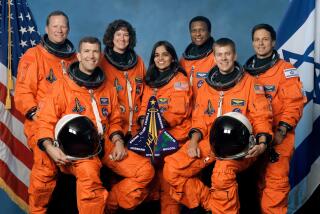2 Cosmonauts Back From Mir Blast Critics
- Share via
STAR CITY, Russia — In this aerospace enclave built to glorify Soviet space prowess, two cosmonauts just back to Earth after six accident-prone months aboard the Mir space station Saturday fended off the reproaches of a new Russia where heroes are harder to find.
An atmosphere of defensiveness pervaded a brief and volatile news conference that was the first public appearance by veteran cosmonauts Vasily Tsibliyev and Alexander Lazutkin since their Thursday return from the most disastrous mission in the Russian station’s troubled 11-year history.
“A scapegoat can always be found,” brooded Tsibliyev, the former Mir commander who has taken the brunt of official criticism for the spate of accidents that has left Mir perilously underpowered and sometimes drifting in the dark.
Still struggling to adjust to gravity after half a year of weightlessness, Tsibliyev and Lazutkin were peppered with questions about their culpability in the accidents that occurred on their watch, including the June 25 collision with an unmanned cargo ship that destroyed most of the mission’s scientific experiments and knocked out nearly half of the station’s power.
Russian media and even President Boris N. Yeltsin have directed blame for the failures at the weary crewmen, but the cosmonauts lashed out at their accusers with an intensity that belied their fatigue.
“We should have abandoned the station several times, if we were following the rules, but we did not do that,” Tsibliyev said. “We are professionals, and it never occurred to us to give up on the station to save our own necks.”
He pointed out three incidents that under Russian Space Agency regulations would be serious enough to abort a mission: a fire caused by a faulty oxygen canister in February; the disastrous June collision; and the inadvertent shutdown of an on-board computer a month ago that caused a failure of life-support systems.
A commission has been set up by the Russian space program to investigate the incidents, which have cost Moscow millions of dollars in repairs and lost income.
Neither Tsibliyev nor Lazutkin would discuss their roles in the accidents that befell Mir during their stewardship, but both men linked the misfortunes to the generally deteriorating conditions in their country.
*
“The cause lies in the problems on the ground,” Tsibliyev said. “They are connected with the economy, with the general state of things here. Vital materials are impossible to procure now, either because they are no longer being manufactured or because they are in short supply or cost too much.”
Lazutkin added that the accidents and breakdowns “were not the fault of concrete individuals but of the need for qualitative development of new hardware.”
While Yeltsin on Aug. 8 blamed Mir’s string of accidents on “the human factor,” more charitable assessments by aerospace specialists have taken into account the space station’s age and its nearing obsolescence.
When it was launched in 1986, Mir was intended to serve as the Soviet Union’s orbital laboratory for only five years. But as plans for an international space station have been set back and its launch is now expected only in 1999, Mir has been repeatedly patched up to maintain a training station.
The cosmonauts indicated that they took offense at media characterizations of their mission as one jinxed from the onset. On Friday, the daily Komsomolskaya Pravda observed: “For what reason fate declared war on this particular crew is unclear. Some evil forces may have been at work in space.”
Tsibliyev conceded that his latest space voyage was problem-plagued from start to finish, including the failure of their Soyuz capsule’s retro rockets to fire just short of landing on the steppes of Kazakhstan on Thursday. As a result, the capsule “hit the ground very hard,” having fallen for miles with only parachutes to brake the descent.
Still, Tsibliyev wryly described his latest spaceflight as successful.
“We returned alive and well. . . . There were no corpses,” the 43-year-old air force colonel said.
Meanwhile, the two Russians who took over control of Mir from Tsibliyev and Lazutkin have been trying, with U.S. astronaut Michael Foale, to assess the damage inflicted by the June collision and get the space station back in working order.
On Saturday, Mir commander Anatoly Solovev and flight engineer Pavel Vinogradov inspected the spacesuits and gear that will be needed during a risky spacewalk set for Wednesday to attempt repairs on the Spektr research module punctured in the crash.
The two Russian crewmen are expected to try to reconnect power cables to the solar batteries attached to Spektr--lines that had to be cut after the accident to seal off the research module when it began losing air.
If full power can be restored to Mir in that operation, the crewmen may try to patch the hole in Spektr as soon as early September.
On Friday, the Mir crew made an exploratory flight around the space station in their escape capsule to videotape Spektr’s exterior in hopes of locating the puncture that depressurized the module and destroyed the scientific research projects and data that had been stored inside.
More to Read
Sign up for Essential California
The most important California stories and recommendations in your inbox every morning.
You may occasionally receive promotional content from the Los Angeles Times.











